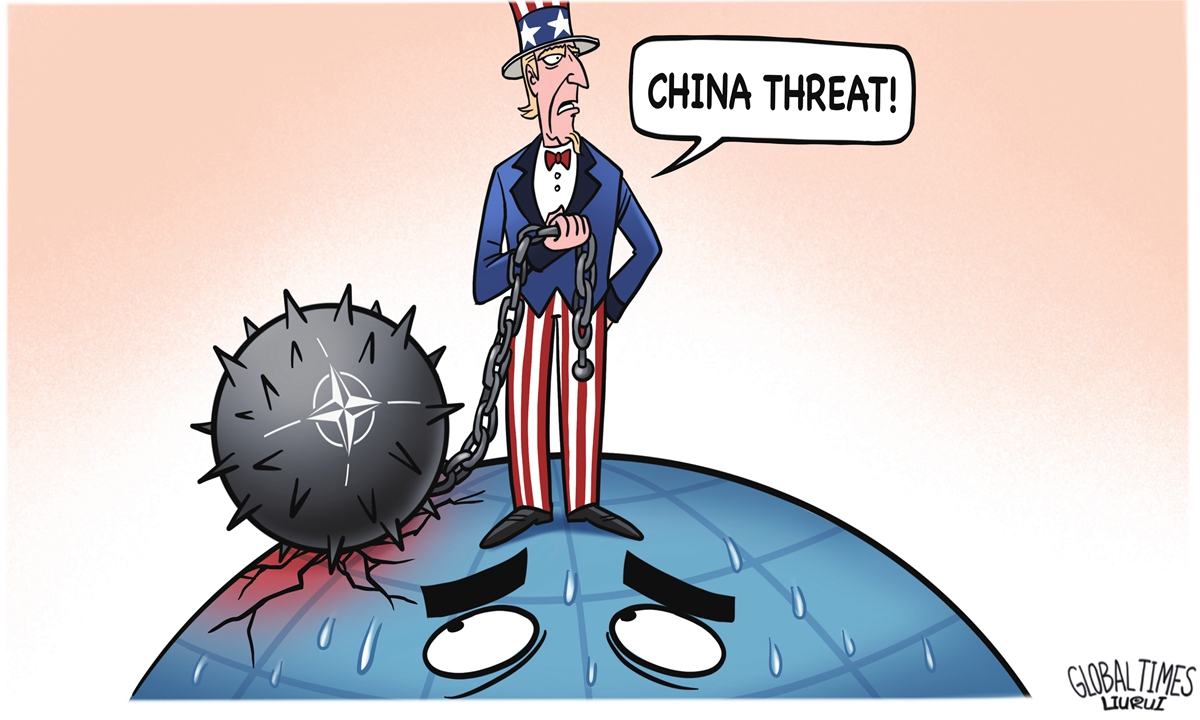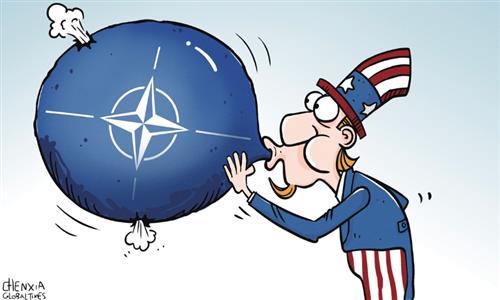
Illustration: Liu Rui/GT
It is known that NATO is shortened to the North Atlantic Treaty Organization. However, unwilling to be stuck in the North Atlantic area because of its name, the transatlantic alliance is now striving to extend its reach into the Asia-Pacific under the guise of addressing the "China challenge."On Tuesday, NATO issued the Vilnius Summit Communiqué claiming that China's "ambitions and coercive policies challenge our interests, security and values," and that China posed "systemic challenges" to the bloc. The South China Morning Post called the joint statement the "sternest rebuke to date."
In response, a spokesperson of the Chinese Mission to the EU slammed the communiqué as "filled with repetitive rhetoric echoing the Cold War mentality and ideological bias," criticized NATO's bad track record in history, and reaffirmed China's firm opposition to the organization's eastward movement into the Asia-Pacific region.
China's "systemic challenges" were firstly mentioned in the NATO 2022 Strategic Concept released last year. The Vilnius Summit Communiqué continued to use this term and provided further details on the specific threats China poses to NATO and how the bloc is preparing to respond. Obviously, over the past year, NATO's understanding of China and its relations with Beijing have not undergone substantial changes. Instead, they have become increasingly extreme and confrontational.
This trend is not only evident in official statements, but also in actions taken by the organization, such as the increased focus on the Asia-Pacific region. In an effort to further contain China, NATO on Wednesday - the second and the last day of the Vilnius Summit - signed the so-called Individually Tailored Partnership Program with Japan and hosted a leaders' session with the transatlantic alliance's four Asia-Pacific partners, known as the AP4.
Regarding NATO's expansion into the Asia-Pacific, the US is certainly the main driving force behind it. On the one hand, by its very nature, NATO is, first and foremost, a US-owned, -led, and -manipulated group, so it's no surprise that the US' strategic intentions can be found in the bloc's joint statement.
On the other hand, facing growing "challenges," Washington feels it actually has limited strategic tools and resources. Despite US attempts to develop new groups in the Asia-Pacific region, NATO remains the most convenient option for reflecting Western security or military presence. For the US, utilizing a better-manipulated puppet is a more effective strategy without the need to allocate additional strategic resources.
Although NATO has not yet succeeded in establishing a liaison office in Tokyo, experts told the Global Times that this is still in the organization's plan. Furthermore, NATO may explore other means to demonstrate its presence in the Asia-Pacific region in the future, such as developing substantive bilateral relations with its so-called partners and even conducting military operations under the NATO banner.
But NATO can no longer fool the world, as we have long seen through what kind of bloc NATO is: It is a mania under the Godfather, the US. The US-led bloc often uses the term "international organization" to hide the true nature of a gangster-like coterie. In addition, the US as the leader of this gang prefers to manipulate its lackeys into instigating conflicts while it watches from a distance. Based on these observations, it is fitting to rename NATO as the "North Atlantic Thug Organization."
What's more, NATO's strategic thinking, deeply rooted in Western strategic concepts and culture, will only fail to acclimatize to the soil of the Asia-Pacific. After decades of taking economic cooperation and regional peace and prosperity as its main policy starting point, Asia-Pacific has developed its own set of culture and logic for dealing with regional security issues, which significantly differs from NATO's.
In the face of the transatlantic alliance's growing ambition in the region, Asia-Pacific now has to take action. "Regional countries, first of all, needs to have a sense of autonomy; that is, the security issues in Asia-Pacific should be resolved under the leadership of regional countries, not external forces," noted Cui Hongjian, director of the Department of European Studies at the China Institute of International Studies.
"Second, Asia-Pacific countries, in particular, should keep a good balance between development and security. Now, despite turmoil in the world, including geopolitical conflicts in other regions, Asia-Pacific should consciously build a firewall to prevent geopolitical confrontation from infecting our region," he added.

